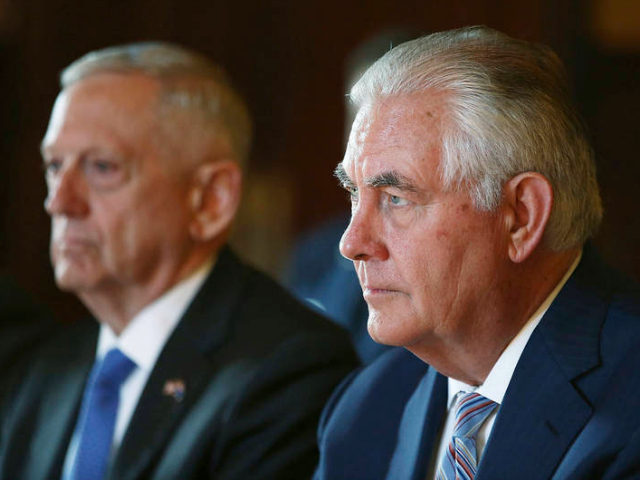WASHINGTON, DC – Secretary of State Rex Tillerson and Defense Secretary James Mattis argued this week against a new authorization for the use of military force that would place any limitations on the U.S. military’s ability to go after terrorists.
They argued to the Senate Foreign Relations Committee on Monday evening that President Trump’s Article II power, existing Title 10 authorities, and the 2001 and 2002 Authorizations for Use of Military Force (AUMFs) currently provide the sufficient war authorities they need.
“The United States has legal authority to prosecute campaigns against the Taliban, Al Qaeda, and associated forces including Isis and is not currently seeking any new or additional Congressional authorization for the use of force,” Tillerson told the committee.
“The 2001 and 2002 authorizations to use military force, or AUMF, remain a sound basis for ongoing U.S. military operations against a mutating threat,” Mattis added.
Both argued, however, if Congress does draft a new AUMF, it should not come with any restrictions on time, geography, or designations of particular forces. Mattis said enemies can use those limitations against the U.S. — a strategy he called “lawfare.”
He said:
What we’ve seen is, these groups come apart, go back together. They change their names as often as a rock-and-roll band. They’re keenly aware that they’ve got – they’ve got certain legal strictures on our side that they can take advantage of. We call it “lawfare,” where they actually use our laws against us. We’ve seen it. We read their mail. We know what they’re thinking in many cases.
Tillerson said any new AUMFs must come before or simultaneously with the repeal of the old ones to avoid gaps in authorities. Mattis recommended against repealing either AUMF. The 2001 AUMF authorized the use of military force in the 2001 War in Afghanistan, and the 2002 AUMF authorized the use of military force in the 2003 war in Iraq.
Members of Congress have tried in vain for the past several years to draft a new AUMF tailored to today’s terrorist fights but have disagreed along party lines on what it should include.
Generally, in the past, Democrats have tried to set limits on the White House’s ability to wage war, while Republicans have argued it would unnecessarily tie commanders’ hands. Those same dynamics largely played out during the hearing, with mostly Republicans questioning limits and mostly Democrats arguing for the need for accountability.
Senate Foreign Relations Committee chairman Bob Corker (R-TN) took a middle stance.
“I also believe we should update the AUMF to reflect the current conflict and reassert Congress’ constitutional role, but we cannot risk undermining the legal foundation for this critical fight,” he said.
Sen. Jeff Flake (R-AZ), a moderate, and Sen. Rand Paul (R-KY), a Libertarian, both expressed concerns over waging war without accountability.
“Not one member of this panel was in the Senate when the 2001 AUMF was passed, or the 2002 [one], for that matter. Seven of us were in the House during that time and voted on it,” Sen. Flake said.
Sen. Paul, who tried to force an AUMF vote on the Senate floor this year, pointed the finger at Congress, noting that it was their job to enforce their constitutional right to declare war, regardless of what an administration says.
“If we want to fix it, we should fix it. You know we complain, the administration is going to take [the] power. We should reassert our power. It’s not just us. It’s been generation after generation of Congress just acquiescing in this,” he said.
Sen. James Risch (R-RI) expressed skepticism that at the end of the day, there would be any new measure.
“I have seen dozens of iterations of what a bill would look like, a resolution would look like. And the problem is, we get high centered on the details. And after listening to all this, I’m a little pessimistic about whether we can actually do something new,” he said.
“The old system is in place, and with, with all due respect to my good, my really good friend Sen. Flake, none of us voted on the original 2001-2002, but we vote every year on this when it comes to the appropriations,” he said.
The hearing comes as Congress — particularly Democrats — are looking to set limits on President Trump’s war-making authorities.
Democrats during the hearing expressed alarm at the U.S. military’s mission to train, advise, and assist Nigerien forces after four soldiers were recently killed in Niger, even though the mission began under President Obama in 2013 and lawmakers have been notified of the mission every six months since.
They also expressed concern about President Trump’s potential launch of a preemptive nuclear strike at North Korea, despite the administration’s pursuit of a diplomacy-first strategy and every previous president not forswearing first strike capability.
Mattis and Tillerson told senators that the president has the authority to strike in the case of “an imminent attack” and if the U.S. is attacked but said using force in any other situation would depend on the facts at the time.
But they assured that if there is an attack against the U.S., ballistic missile defense forces would immediately go into action as the president deliberates a response.
“Defenses will go, sir,” Mattis said. “We’ve rehearsed this, I will just tell you, routinely.”
The response would be in alliance with allies, and Congress would be “intimately” involved, he added.

COMMENTS
Please let us know if you're having issues with commenting.